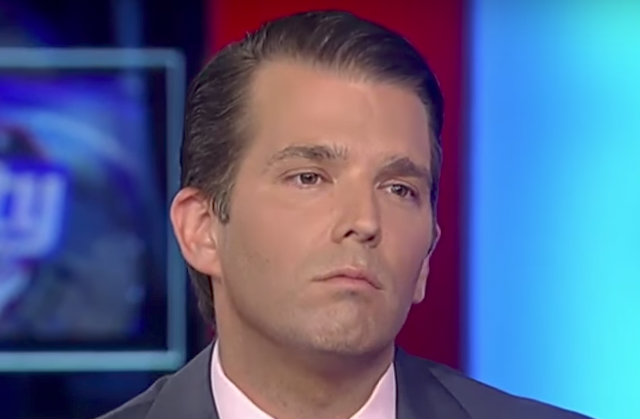 On Wednesday, Donald Trump Jr claimed attorney-client privilege in order to avoid answering questions about conversations he had with his father, President Donald Trump. Don Jr was testifying before the House Intelligence Committee in a closed door session. The questions specifically surrounded what he talked about after news broke publically that he had met with a Russian attorney at Trump Tower in an attempt to gather “dirt” on Hillary Clinton.
On Wednesday, Donald Trump Jr claimed attorney-client privilege in order to avoid answering questions about conversations he had with his father, President Donald Trump. Don Jr was testifying before the House Intelligence Committee in a closed door session. The questions specifically surrounded what he talked about after news broke publically that he had met with a Russian attorney at Trump Tower in an attempt to gather “dirt” on Hillary Clinton.
Trump Jr. told lawmakers that he had the right to invoke attorney-client privilege because even though neither he nor the president are attorneys, there was an attorney present in the room.
Can he claim privilege in this situation? Rep. Adam Schiff, a California Democrat said that he did not believe someone could “shield communications between individuals merely by having an attorney present.”
However, before you brush off his claim completely, there are some circumstances where Don Jr. might actually be correct here.
Generally speaking, the privilege works to protect communications between a client and his/her attorney, and is ordinarily invoked by the attorney in response to some sort of legal demand.
As for this particular situation, we turned to well-known legal ethics expert Stephen Gillers, who is a law professor at NYU.
A lawyer in the room is insufficient to privilege the conversation between the Trumps unless the lawyer was there representing BOTH of them on the subject of the conversation. If the lawyer is representing only one of them, there is no privilege because the presence of the unrepresented person means the conversation is not confidential.There is one exception to this. If the other person in the room is also represented by a lawyer who, as it happens, is not there, AND if the parties have a common interest agreement, the conversation between the two clients and the lawyer for one of them on the subject of common interest agreement is privileged. But there must be a common interest agreement in effect at the time of the conversation.It is the burden of the person claiming the privilege to show that it exists. Simply saying “there was a lawyer in the room” does not carry that burden. However, the only way the House can defeat the claim of privilege is to hold Trump Jr. in contempt and hash it out in court.
At this point, we don’t know who the attorney was in the room, and if he/she represented both Trump and his son. We need more information to determine whether there was privilege.
Overall, some legal experts aren’t buying it and are having a field day with this one.
To: My students studying for the Professional Responsibility final exam.
From: Professor Kerr
Message: Don’t try to learn the attorney-client privilege from @DonaldJTrumpJr. https://t.co/gQgQTS6eCn pic.twitter.com/kQLYOkbdM0— Orin Kerr (@OrinKerr) December 7, 2017
There is also an entirely different question of whether Don Jr could even cite this kind of privilege during congressional testimony.
“The privilege is a product of statute — the federal rules of evidence — and is available only in court. However, Congress has allowed claims of privilege while making it clear over the years that this is discretionary, not a right,” Gillers explained.